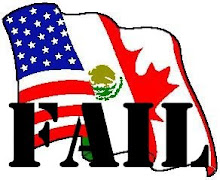I posted recently praising the work of our border officers in dealing with some not so nice individuals. Unfortunately, I know have to give them a smack.
According to a news story by the Canadian Press, an internal review of Canada Border Services Agency determined that 535 people convicted of serious crimes were allowed to enter Canada for compassionate or economic reasons. What sort of serious crimes?
The list of crimes included child molestation, fraud, automobile homicide, burglary, bank theft, arson, cocaine trafficking, handgun possession and other offences.
Border guards are allowed to issue temporary resident permits at their discretion. These would be required for someone with a criminal past. But these shouldn’t be handed out as if you could get them in a crackerjack box. Exceptions are supposed to be for
…humanitarian or compassionate reasons, or for the economic benefit of Canada.
And the time limit on these permits can be from a day to three years. Once people are in the country, there’s no way to track them unless they pop up on Canadian authorities radar.
This is all very frustrating, especially when the US is already criticising us for our supposed lax border. But this also raises a very important question that applies to both sides of the US/Canada border: why are we allowing our border officers to make these type of calls?
In my mind there are two main issues that a border deals with: Security and Immigration.
Security deals with the criminal aspect as well as the environmental. It’s the piece that catches the bad guys and ensures that nothing that could potentially harm citizens is allowed to enter the country.
Immigration deals with the social and economic aspects of the border. Work, migrating, visiting, etc.
Both, IMO, require a different set of skills. I think back to my own experience at the US border where, when I stated that I was going to speak at a conference for free, the officer said “So you’re going just out of the goodness of your own heart?” He’s trained to look for people trying to enter the country illegally – a security issue.
But the reality is that many people *do* cross over and speak for free, especially in my industry. But why would the expectation be that this officer, trained in a form of law enforcement, be able to make valid judgement calls on matters of immigration?
In 2005 a Canadian attempted to cross the border for a work opportunity. He told the border guard that he was a professional blogger. The guards response? “Blogging isn’t a job.” Maybe not on the listing of TN-status qualifying positions, but in reality it certainly could be.
And that’s the problem with our border: we have guards on both sides that obviously are not qualified to make certain types of decisions. In the US, we see one extreme where a Canadian discovered to take LSD 40 years ago is now banned for life. In Canada, we see the other extreme where bank robbers and arsonists are allowed into our country.
If Canada and the US want to ensure that their borders stay as secure as possible without limiting commerce and trade, the roles and expectations of the officers who patrol our borders needs to be re-evaluated and re-aligned with 2009. Immigration issues cannot be scrutinized using the same methods you would in a security situation.




No comments:
Post a Comment